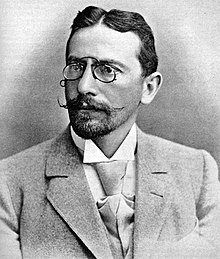Siegbert Tarrasch
| Siegbert Tarrasch | |
|---|---|

Siegbert Tarrasch
|
|
| Full name | Siegbert Tarrasch |
| Country | Germany |
| Born |
5 March 1862 Breslau (Wrocław), Province of Silesia, Kingdom of Prussia |
| Died | 17 February 1934 (aged 71) Munich, Germany |
Siegbert Tarrasch [ziːɡbɐt taraʃ] (5 March 1862 – 17 February 1934) was one of the strongest chess players and most influential chess teachers of the late 19th and early 20th century.
Tarrasch was born in Breslau (Wrocław), Prussian Silesia, to his father Xander Tarrasch. Having finished school in 1880, he left Breslau to study medicine in Halle. With his family, he settled in Nuremberg, Bavaria, and later in Munich, setting up a successful medical practice. He had five children. Tarrasch was Jewish, converted to Christianity in 1909, and a patriotic German who lost a son in World War I, yet he faced antisemitism in the early stages of Nazism.
Tarrasch's main books were: (i) Dreihundert Schachpartien (1895), translated by S. Schwarz as Three Hundred Chess Games (1999), (ii) Die moderne Schachpartie (1912), and (iii) Das Schachspiel (1931), translated by G. E. Smith and T. G. Bone as The Game of Chess (1935, ). The third is in three parts: the endgame, the middlegame and the opening. It was his last book and his most successful.
A medical doctor by profession, Tarrasch may have been the best player in the world in the early 1890s. He scored heavily against the aging World Champion Wilhelm Steinitz in tournaments, (+3-0=1), but refused an opportunity to challenge Steinitz for the world title in 1892 because of the demands of his medical practice.
Soon afterwards, in St. Petersburg in 1893, Tarrasch drew a hard-fought match against Steinitz' challenger Mikhail Chigorin (+9-9=4) after leading most of the way. He also won four major tournaments in succession: Breslau 1889, Manchester 1890, Dresden 1892, and Leipzig 1894.
...
Wikipedia
